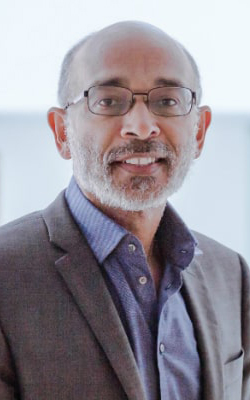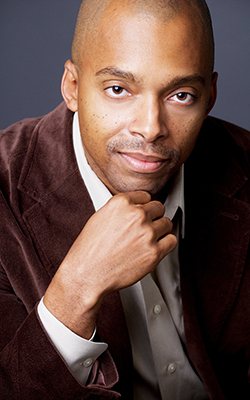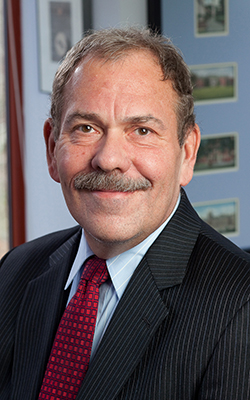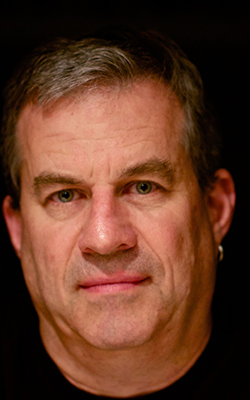University Lecture Series Announces Provocative Spring Lineup
By Bruce Gerson
A significant mystery of modern medicine, race inequality, transforming higher education and the opioid crisis, are among the timely and provocative topics of this semester’s University Lecture Series.
After a successful revival of the ULS last fall, Amy Burkert is looking forward to the spring lineup.
“One of the benefits of being a part of a vibrant university community is the opportunity to expand our understanding of, and engagement with, important ideas and issues,” said Burkert, vice provost for education and co-chair of the ULS Committee. “Building on the momentum of the standing-room only ULS lectures this fall, we are looking forward to welcoming the spring slate of thought leaders and activists into our community, who will bring us together to learn new things, challenge our ways of thinking, and prepare us to embrace an increasingly complex and ever-changing future.”
Burkert said the forums are most robust and meaningful when multiple views and perspectives are considered and shared.
“We encourage all members of our community to join in and enrich the experience for everyone,” she said.
Dickson Prize Lecture
Dr. Emery N. Brown
4:30 p.m., Thursday, Jan. 31 — The Dickson Prize in Science lecture has been cancelled due to the extreme cold temperatures. The event will be rescheduled.
Simmons Auditorium A, Tepper Building
 Dr. Emery Brown, one of the world’s leading physicians and scientists and this year’s winner of Carnegie Mellon University’s Dickson Prize in Science, will open the spring ULS offerings with “The Dynamics of the Unconscious Brain Under General Anesthesia.”
Dr. Emery Brown, one of the world’s leading physicians and scientists and this year’s winner of Carnegie Mellon University’s Dickson Prize in Science, will open the spring ULS offerings with “The Dynamics of the Unconscious Brain Under General Anesthesia.”
Brown is the renowned Edward Hood Taplin Professor of Medical Engineering and Computational Neuroscience at MIT, the Warren M. Zapol Professor of Anesthesia at Harvard Medical School and an anesthesiologist at Massachusetts General Hospital (MGH). He directs an interdisciplinary team studying the neuroscience of general anesthesia, which is considered one of the most significant mysteries of modern medicine. He also leads the Neuroscience Statistics Research Laboratory at MGH and MIT, where his team is developing statistical methods and signal processing algorithms to analyze data collected from neuroscience experiments.
Brown’s research has developed a framework for understanding how anesthetic drugs create the altered state of general anesthesia. His statistics research is developing algorithms and methods to accurately characterize the dynamic properties of neuroscience data.
One of only 21 people who are members of all three National Academies — Medicine, Science and Engineering — Brown is considered the "world's expert on statistical analysis of neuronal data," and his work in anesthesia has been "truly transformative," said CMU Statistics Professor Robert Kass, who nominated Brown for the Dickson Prize.
Martin Luther King Jr. Keynote Lecture
Khalil Gibran Muhammad
4:30 p.m., Monday, Feb. 11
McConomy Auditorium, Cohon University Center
 Khalil Gibran Muhammad, a leading scholar on racial justice in America, will share his perspective on “Race, Inequality, and American Democracy."
Khalil Gibran Muhammad, a leading scholar on racial justice in America, will share his perspective on “Race, Inequality, and American Democracy."
Muhammad is a professor of history, race and public policy at Harvard University’s Kennedy School and the Suzanne Young Murray Professor at the Radcliffe Institute for Advanced Studies. His research focuses on the racial politics of the criminal justice system, from laws to policing and punishment. His award-winning book, “The Condemnation of Blackness: Race, Crime, and the Making of Modern Urban America,” chronicles the formation of black criminality in contrast to working-class whites and European immigrants.
“Professor Muhammad is one of the foremost young scholars of the 20th century African-American and U.S. experience today,” said Joe Trotter, CMU’s Giant Eagle Professor of History and Social Justice.
Muhammad is a contributor to The Nation magazine on topics such as the way the alt-right uses social science to increase acceptance of racism. He has written about the 2018 documentary, "Stranger Fruit," about Michael Brown, who was killed by a white police officer in 2014 in Ferguson, Missouri. His work on playing “the race card” has appeared in The New York Times.
In 2017, Muhammad received the Distinguished Service Medal from Columbia University’s Teachers College. He is the former director of the Schomburg Center for Research in Black Culture, a division of the New York Public Library and the world’s leading library and archive of global black history.
Simon Initiative Distinguished Lecture
Arthur Levine
4:30 p.m., Thursday, March 21
Simmons Auditorium A, Tepper Building
 Arthur Levine, the sixth president of the Woodrow Wilson Foundation, is an expert on the preparation of school leaders, teachers and education researchers. In his talk, "The Future of HIgher Education: Three Forces with the Capacity to Transform America's Colleges and Universities," Levine will explore how much, in what ways and by what process higher education can be expected to change in the years ahead.
Arthur Levine, the sixth president of the Woodrow Wilson Foundation, is an expert on the preparation of school leaders, teachers and education researchers. In his talk, "The Future of HIgher Education: Three Forces with the Capacity to Transform America's Colleges and Universities," Levine will explore how much, in what ways and by what process higher education can be expected to change in the years ahead.
Levine is the author of 12 books and dozens of articles and reviews, including a series of reports for the Education Schools Project, an effort that aims to improve the education of teachers, administrators and researchers who serve school-age children. His books include “Generation on a Tightrope: A Portrait of Today’s College Student,” “Shaping Higher Education’s Future,” “Handbook on Undergraduate Curriculum” and “Reform of Undergraduate Education,” for which he won the American Council on Education’s Book of the Year Award.
He has written pieces for The New York Times, the Los Angeles Times, The Wall Street Journal, The Washington Post and The Chronicle of Higher Education. He has earned the Educational Press Association’s Award for Writing three times.
Levine is a member of the American Academy of Arts and Sciences and sits on the boards of Say Yes to Education and Motivis Learning.
ULS Featured Lecture
Sam Quinones
4:30 p.m., Tuesday, April 16
Simmons Auditorium A, Tepper Building
 Sam Quinones, a veteran journalist and author who has written for The New York Times, the Los Angeles Times and National Geographic, will address the deadly opioid crisis in his talk, “Dreamland: America’s Opiate Epidemic and How We Got Here.”
Sam Quinones, a veteran journalist and author who has written for The New York Times, the Los Angeles Times and National Geographic, will address the deadly opioid crisis in his talk, “Dreamland: America’s Opiate Epidemic and How We Got Here.”
Quinones will discuss the various factors that have led to the epidemic, including the influx of black tar heroin, drug company marketing and the over-prescription of pain medication in the 1990s.
Author of the 2015 award-winning book “Dreamland: The True Tales of America’s Opiate Epidemic,” Quinones has testified before the Senate Committee on Health, Education, Labor and Pensions regarding the opioid addiction. He has spoken to the Washington Journal about the federal response to the crisis and his recent op-ed in The New York Times outlines the plague and its impact on communities.
Prior to writing “Dreamland,” which won the National Book Critics Circle Award, Quinones wrote two nonfiction books focusing on immigration, drug trafficking and gangs. He authored “True Tales from Another Mexico: The Lynch Mob, the Popsicle Kings, Chalino and the Bronx,” and “Antonio’s Gun and Delfino’s Dream: True Tales of Mexican Migration.”
His recent work for National Geographic has featured the deportation of illegal immigrants and the resurgence of Juarez, Mexico, once considered among the most dangerous cities in the world.
